一、任务详情
二、任务过程
(一)下载源码,解压后进行编译,检查openssl可执行程序版本号
1.下载源码
2.解压缩(下载tar:yum install tar)
tar xzvf openssl-1.1.1-pre4.tar.gz
tar xzvf openssl-1.1.1-pre5.tar.gz
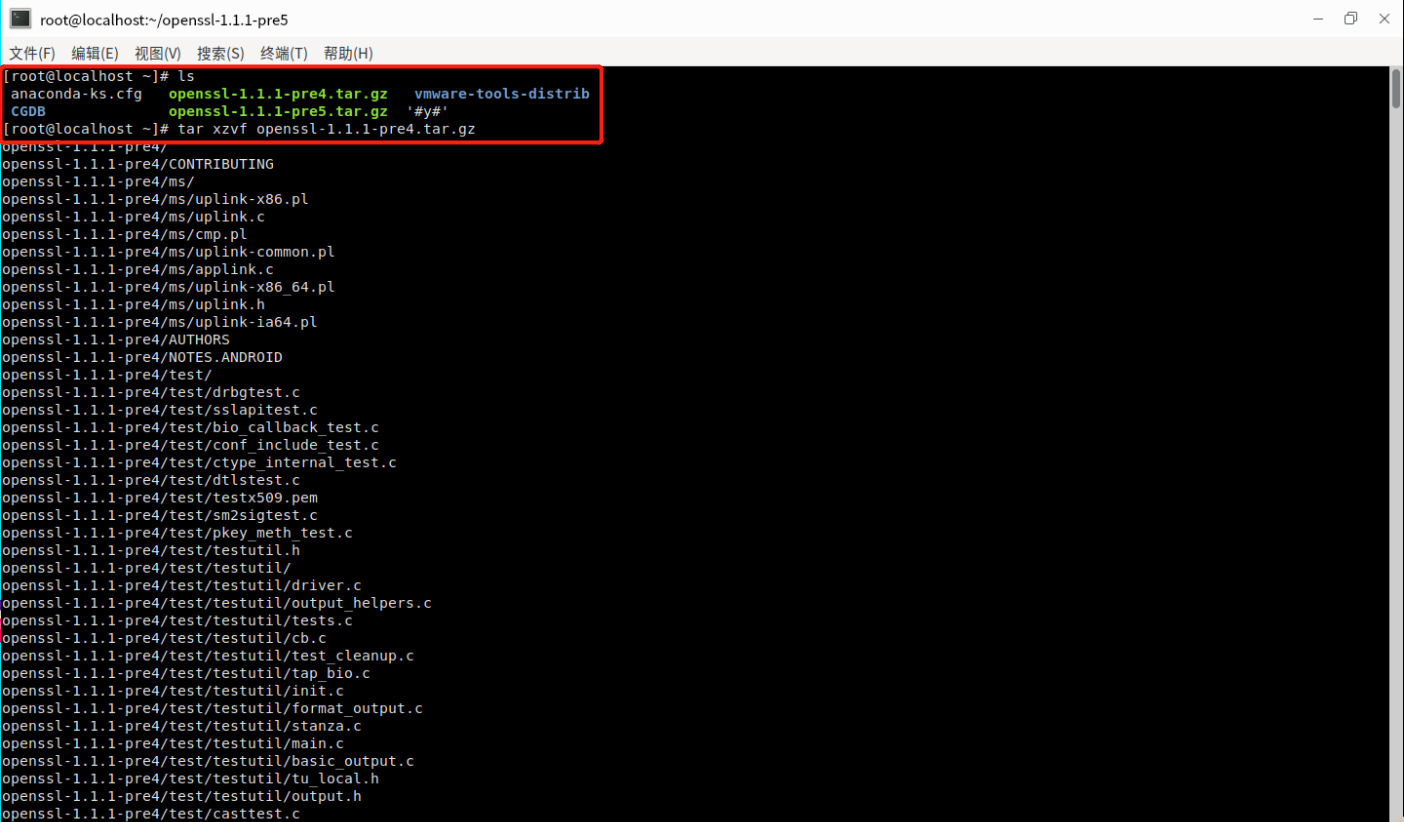
3.编译步骤
cd openssl-1.1.1-pre5
./config
make
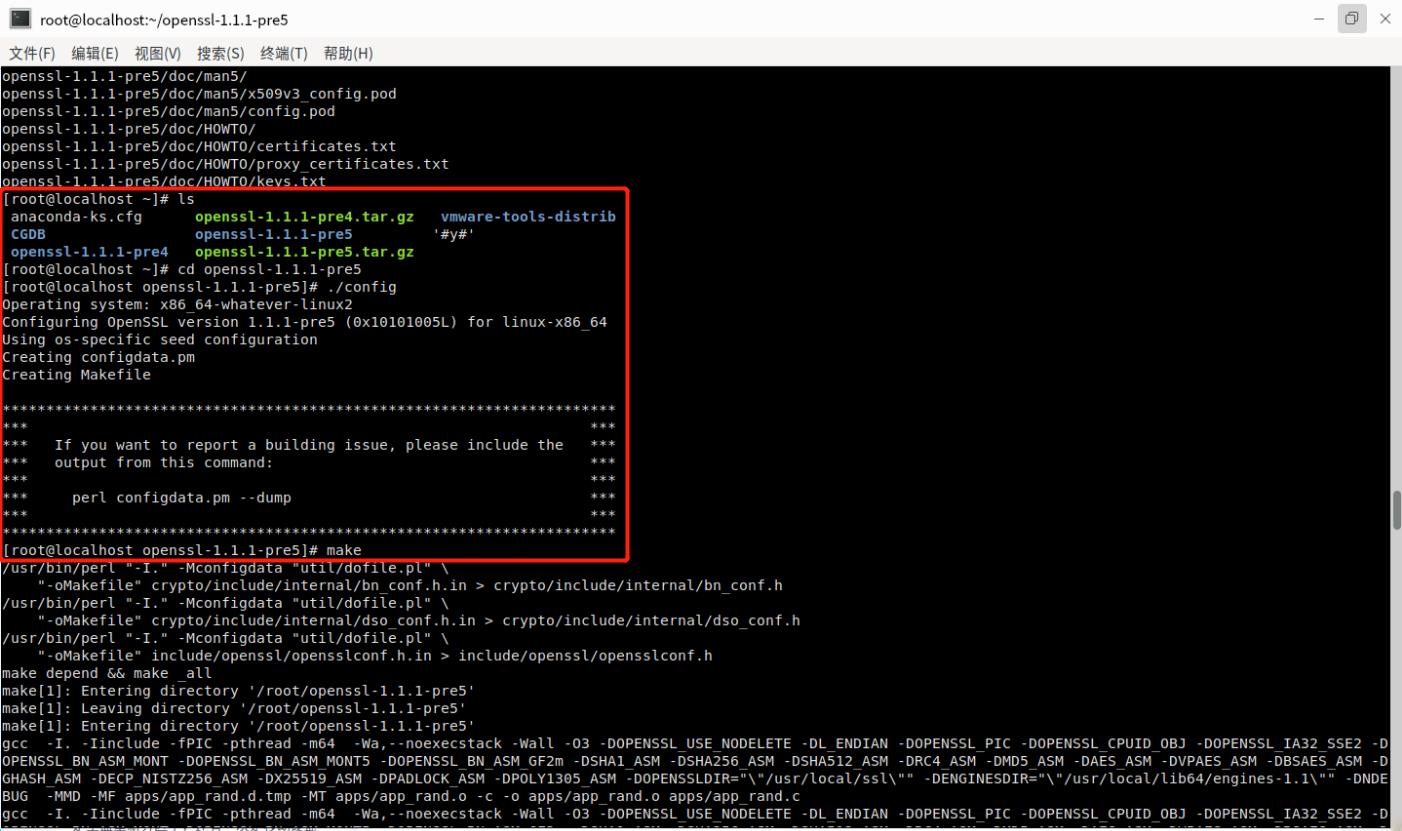
4.配置LD_LIBRARY_PATH并检查openssl可执行程序版本号
export LD_LIBRARY_PATH=`pwd`
./apps/openssl version
(二)检查 SM3 哈希校验和
echo -n "abc" | ./apps/openssl dgst -SM3
(三)检查椭圆曲线是否包含SM2
./apps/openssl ecparam -list_curves | grep SM2
(四)检查对称算法
./apps/openssl enc -ciphers
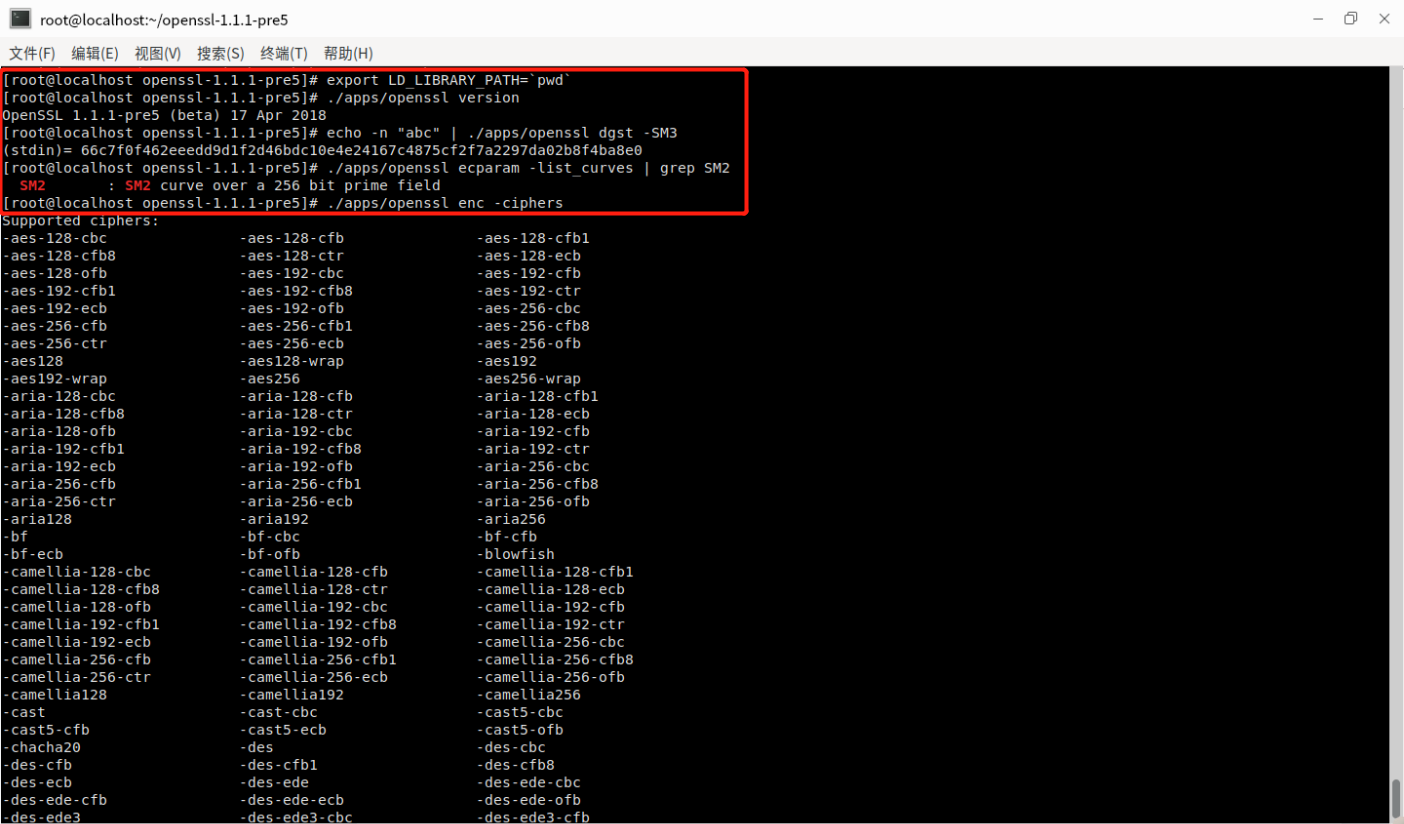
(五)测试SM4-ECB电子密码本模式, 选取AES-128-ECB作为参考
main.c
#include <stddef.h>
#include <stdio.h>
#include <stdlib.h>
#include <string.h>
#include "openssl/err.h"
#include "openssl/evp.h"
#if defined(OPENSSL_VERSION_NUMBER) \
&& OPENSSL_VERSION_NUMBER < 0x10101001L
static const EVP_CIPHER *(*EVP_sm4_ecb)()=EVP_aes_128_ecb;
#endif
typedef struct {
const unsigned char *in_data;
size_t in_data_len;
int in_data_is_already_padded;
const unsigned char *in_ivec;
const unsigned char *in_key;
size_t in_key_len;
} test_case_t;
void test_encrypt_with_cipher(const test_case_t *in, const EVP_CIPHER *cipher)
{
unsigned char *out_buf = NULL;
int out_len;
int out_padding_len;
EVP_CIPHER_CTX *ctx;
ctx = EVP_CIPHER_CTX_new();
EVP_EncryptInit_ex(ctx, cipher, NULL, in->in_key, in->in_ivec);
if (in->in_data_is_already_padded)
{
const size_t bs = EVP_CIPHER_block_size(cipher);
if (in->in_data_len % bs != 0)
{
printf("ERROR-1: data length=%d which is not added yet; block size=%d\n", (int) in->in_data_len, (int) bs);
EVP_CIPHER_CTX_free(ctx);
return;
}
EVP_CIPHER_CTX_set_padding(ctx, 0);
}
out_buf = (unsigned char *) malloc(((in->in_data_len>>4)+1) << 4);
out_len = 0;
EVP_EncryptUpdate(ctx, out_buf, &out_len, in->in_data, in->in_data_len);
if (1)
{
printf("Debug: out_len=%d\n", out_len);
}
out_padding_len = 0;
EVP_EncryptFinal_ex(ctx, out_buf+out_len, &out_padding_len);
if (1)
{
printf("Debug: out_padding_len=%d\n", out_padding_len);
}
EVP_CIPHER_CTX_free(ctx);
if (1)
{
int i;
int len;
len = out_len + out_padding_len;
for (i=0; i<len; i++)
{
printf("%02x ", out_buf[i]);
}
printf("\n");
}
if (out_buf)
{
free(out_buf);
out_buf = NULL;
}
}
void main()
{
int have_sm4 = (OPENSSL_VERSION_NUMBER >= 0x10101001L);
int have_aes = 1;
const unsigned char data[]=
{
0x01, 0x23, 0x45, 0x67, 0x89, 0xab, 0xcd, 0xef,
0xfe, 0xdc, 0xba, 0x98, 0x76, 0x54, 0x32, 0x10,
};
unsigned char ivec[EVP_MAX_IV_LENGTH];
const unsigned char key1[16] =
{
0x01, 0x23, 0x45, 0x67, 0x89, 0xab, 0xcd, 0xef,
0xfe, 0xdc, 0xba, 0x98, 0x76, 0x54, 0x32, 0x10,
};
test_case_t tc;
tc.in_data = data;
tc.in_data_len = sizeof(data);
tc.in_data_is_already_padded = (tc.in_data_len % 16)==0;
tc.in_key = key1;
tc.in_key_len = sizeof(key1);
memset(ivec, 0x00, EVP_MAX_IV_LENGTH);
tc.in_ivec = ivec;
#if defined(OPENSSL_NO_SM4)
have_sm4 = 0;
#endif
if (have_sm4)
{
printf("[1]\n");
printf("Debug: EVP_sm4_ecb() test\n");
test_encrypt_with_cipher(&tc, EVP_sm4_ecb());
}
#if defined(OPENSSL_NO_AES)
have_aes = 0;
#endif
if (have_aes)
{
printf("[2]\n");
printf("Debug: EVP_aes_128_ecb() test\n");
test_encrypt_with_cipher(&tc, EVP_aes_128_ecb());
}
}
gcc -Iinclude -c main.c
gcc main.o libcrypto.so -o 20201212
export LD_LIBRARY_PATH=`pwd`
ldd 20201212
./20201212
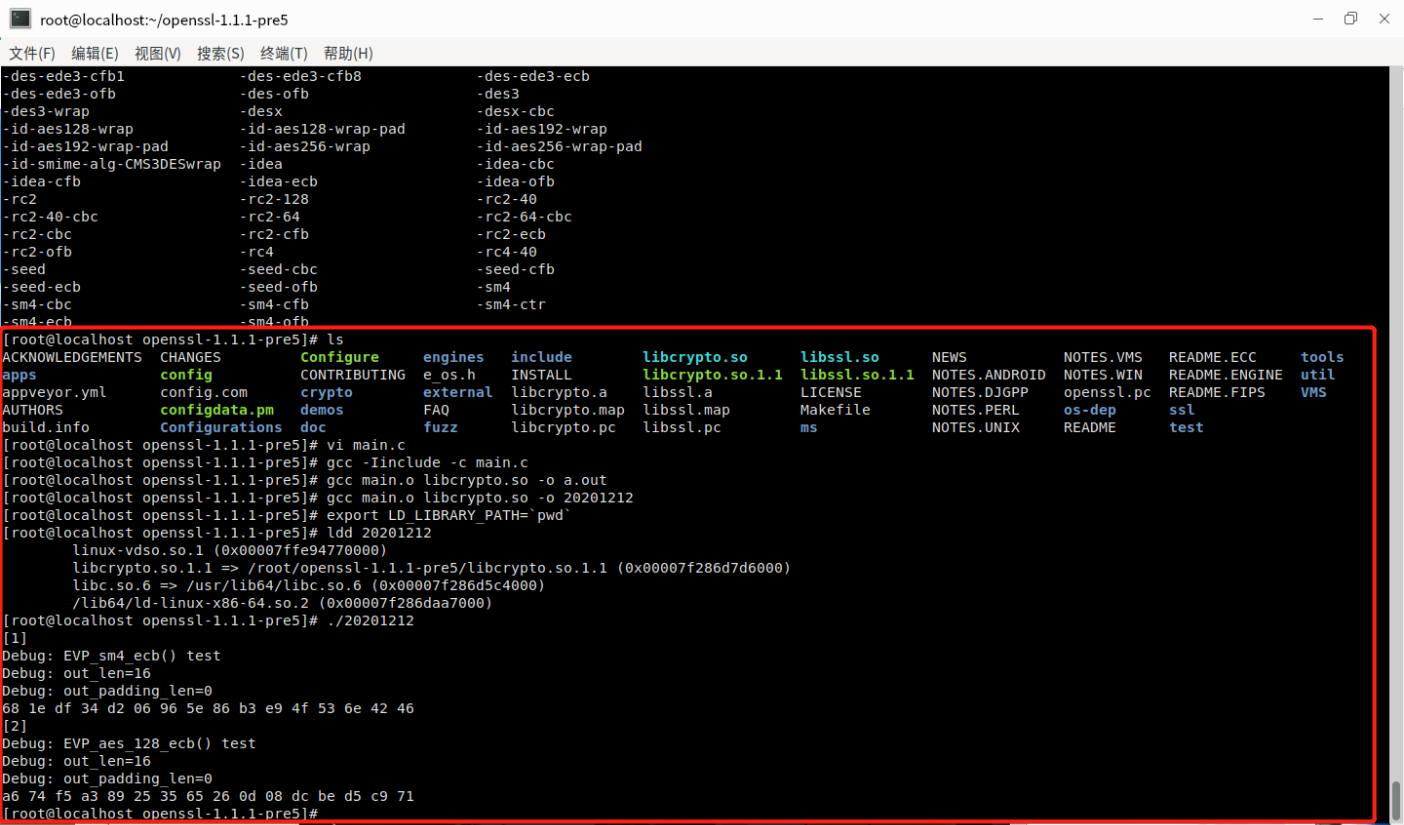
(六)sm3的代码与测试结果
sm3.c
#include <stdio.h>
#include <string.h>
#include <openssl/evp.h>
#include <openssl/err.h>
void tDigest(){
unsigned char md_value[EVP_MAX_MD_SIZE];
unsigned int md_len;
EVP_MD_CTX *mdctx;
mdctx = EVP_MD_CTX_new();
char msg1[] = "20201212";
char msg2[] = "Yang_Chengyu";
EVP_MD_CTX_init(mdctx);
EVP_DigestInit_ex(mdctx, EVP_sm3(), NULL);
EVP_DigestUpdate(mdctx, msg1, strlen(msg1));
EVP_DigestUpdate(mdctx, msg2, strlen(msg2));
EVP_DigestFinal_ex(mdctx, md_value, &md_len);
EVP_MD_CTX_destroy(mdctx);
printf("Debug:Message1%s and Message2%s digest to:\n",msg1, msg2);
for(int i = 0; i<md_len; i++){
printf("0x%02x ", md_value[i]);
}
printf("\n");
}
int main(){
OpenSSL_add_all_algorithms();
tDigest();
return 0;
}
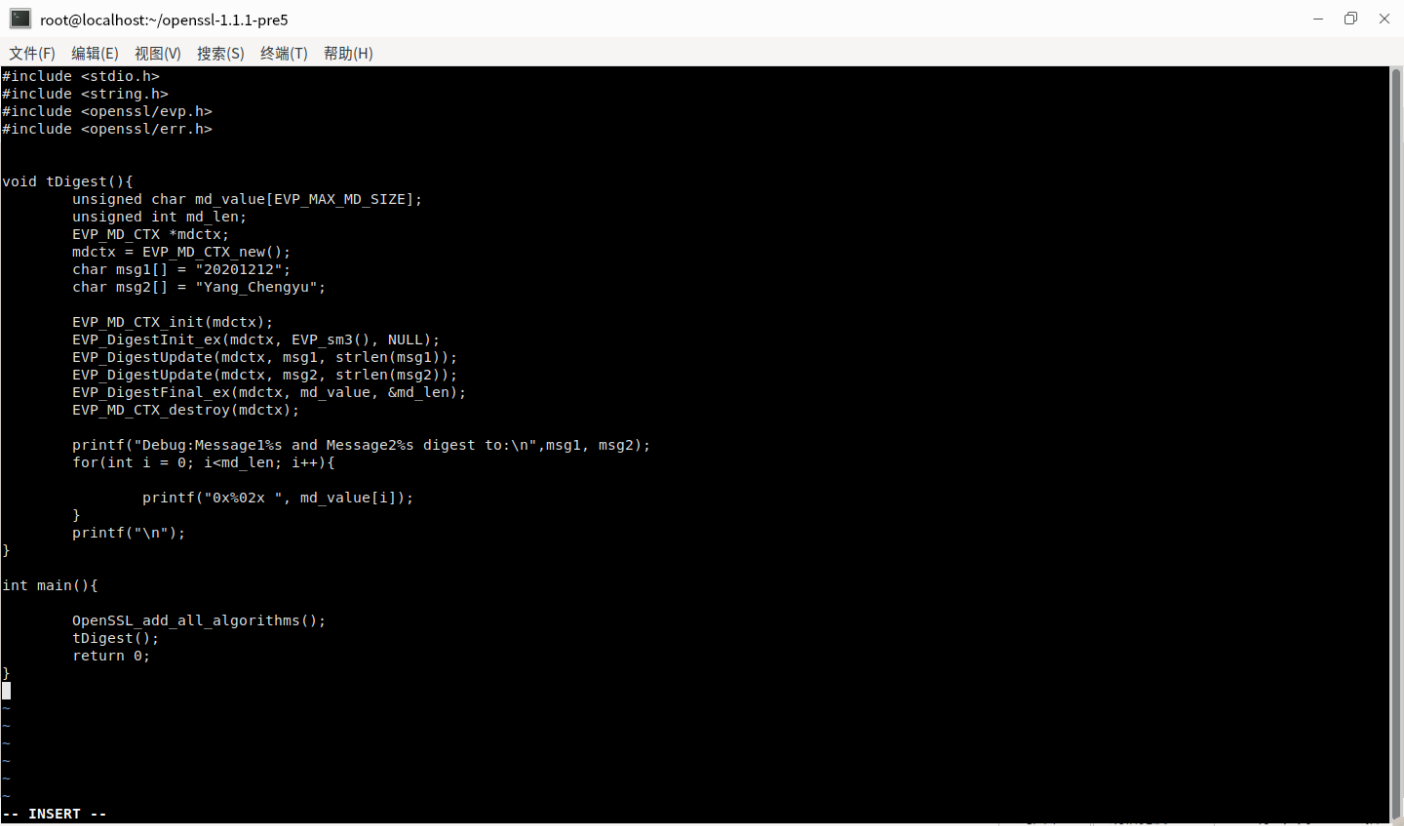
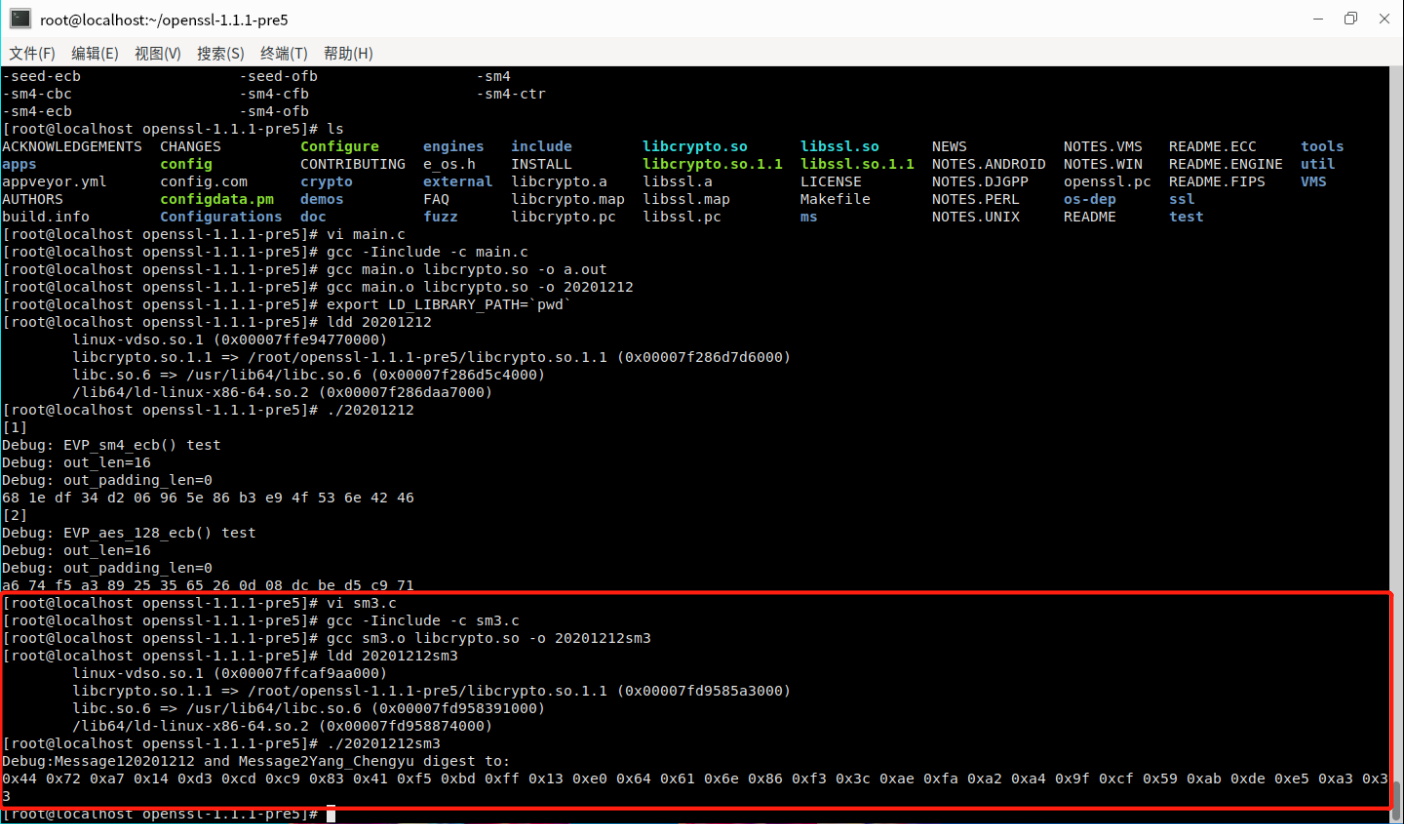









【推荐】国内首个AI IDE,深度理解中文开发场景,立即下载体验Trae
【推荐】编程新体验,更懂你的AI,立即体验豆包MarsCode编程助手
【推荐】抖音旗下AI助手豆包,你的智能百科全书,全免费不限次数
【推荐】轻量又高性能的 SSH 工具 IShell:AI 加持,快人一步
· 阿里最新开源QwQ-32B,效果媲美deepseek-r1满血版,部署成本又又又降低了!
· 开源Multi-agent AI智能体框架aevatar.ai,欢迎大家贡献代码
· Manus重磅发布:全球首款通用AI代理技术深度解析与实战指南
· 被坑几百块钱后,我竟然真的恢复了删除的微信聊天记录!
· AI技术革命,工作效率10个最佳AI工具